A bold new generation of young Kenyan protesters has emerged onto the streets forcing the government to backtrack on some of a series of unpopular tax proposals.
What started as anger on TikTok over a controversial finance bill has turned into a riot – without being organized by political parties.
The president’s government Guilherme Ruto managed to do what generations of politicians in the East African country had failed to do – unite large numbers of Kenyans across ethnicity and party.
On Tuesday, hundreds of sneaker-clad protesters, who feel Kenyans are already overwhelmed and have little to show for it, braved tear gas fired by police to march through the capital, Nairobi, paralyzing the city’s central business district.
Armed with their smartphones, they live-streamed the intense clashes with police.
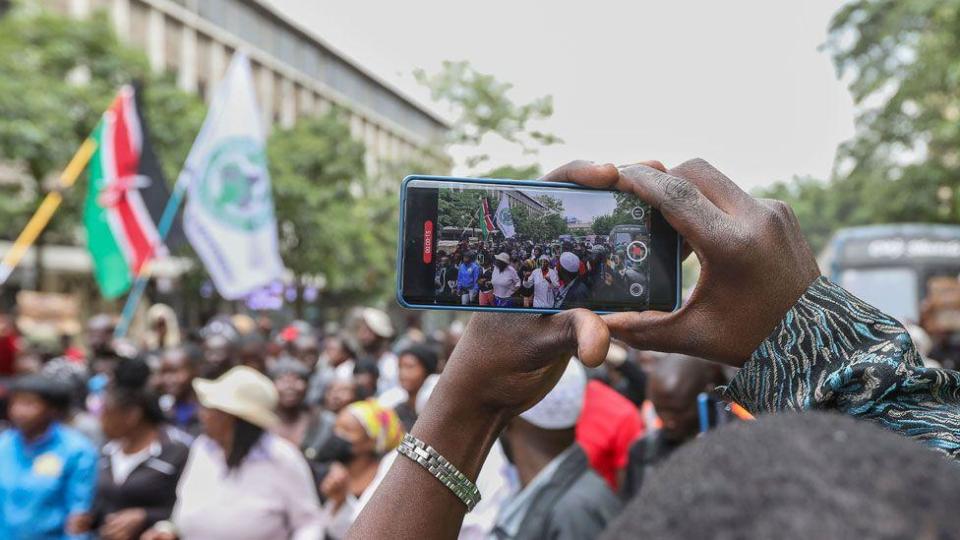
The protests, dubbed “occupy parliament”, were coordinated and mobilized on social media, in contrast to those led and sponsored by politicians.
Organizers encouraged other protesters to wear black clothing, but some still showed up with ripped jeans and sleek hairstyles.
The young protesters, popularly called Generation Z – in reference to the term generally used to describe those born in the late 1990s and early 2000s – turned out in large numbers, promising to ensure that their discontent did not end with just a hashtag or meme. .
“We are Generation Z, we can mobilize. We use TikTok as a space to be able to not only get young people to come and protest, but also to educate them about why,” protester Zaha Indimuli told journalists.
Many of them were demonstrating for the first time and waved signs such as “Don’t force us to pay taxes”, while others shouted: “Ruto must leave”.
“I’m here slaving away for a country I love. It’s the first time I’ve done this because my parents are old and can’t do it anymore,” Ken Makilya, a 24-year-old university student, told the BBC.
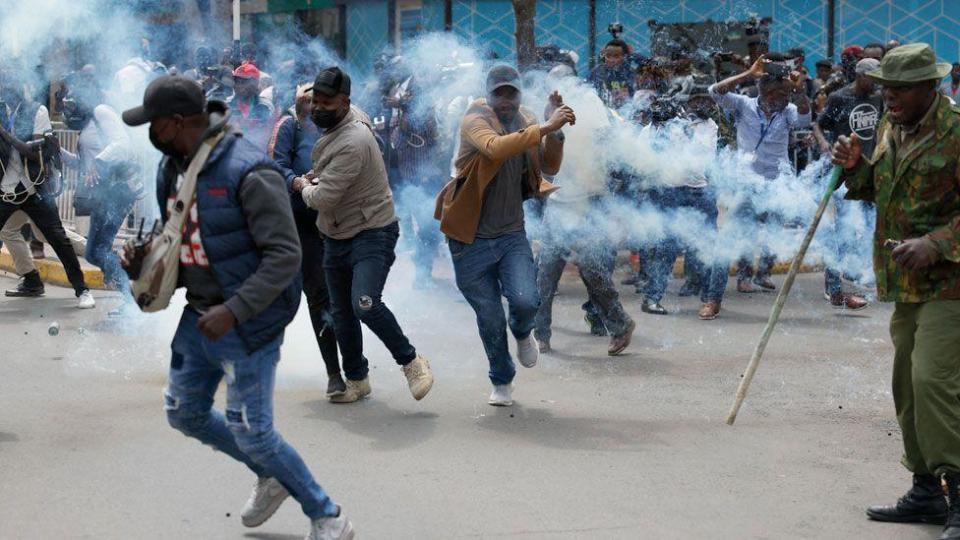

The hashtags used to pressure parliamentarians and rally protesters were “#OccupyParliament” and “#RejectFinanceBill2024”.
“This is my first demonstration. I hope it’s the last. I hope things change after this,” said Naserian Kasura, who opposed the proposal to tax sanitary pads.
Protesters’ efforts to march to parliament were thwarted when police used water cannons to block them.
“We were arrested, but don’t let them get to you, please go to parliament”, posted Hanifa Farsafi, supposedly one of the organizers, on X, formerly Twitter.
More than 200 young protesters were detained, but some of them were later released after lawyers went to the police stations where they had been detained.
“I’m not going, I’m not cooperating, why are you arresting me?” a protester was heard in a viral video refusing to board a police vehicle.
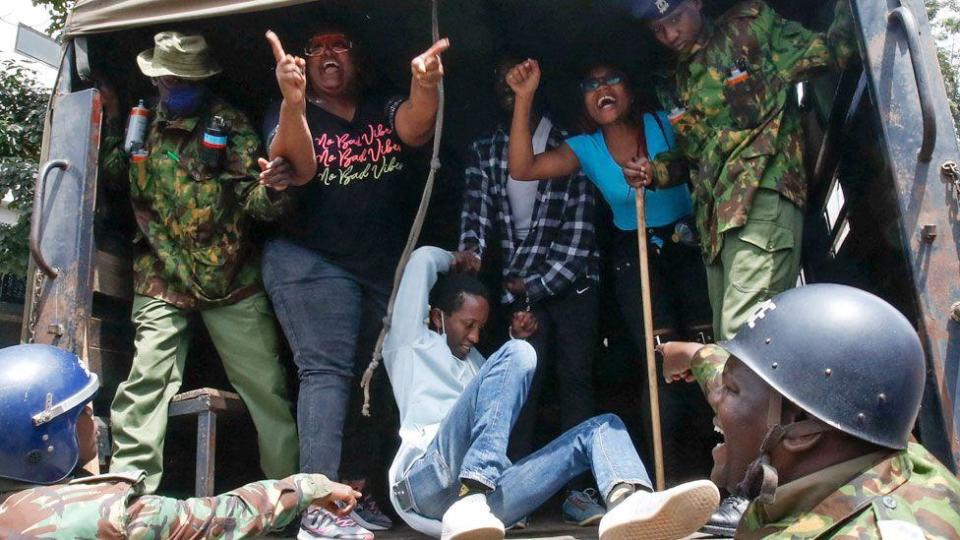

Those who didn’t take to the streets helped spread the news by sharing messages, photos and videos on social media.
Because the protest lacked clear leadership, police had difficulty reaching those behind it. They banned the march on a technicality, although protesters claimed all requirements were met.
And unlike previous anti-government political protests, it was not characterized by looting, property destruction and stone throwing.
No political affiliations or ethnic alignments were mentioned – just a clear determination on the part of the protesters to be heard.
Several hours after protesters mobilized, the presidency appeared to bow to pressure and announced that it would eliminate some of the bill’s most controversial provisions, including a proposed 16% value-added tax (VAT) on bread.
“We have listened to the opinion of Kenyans,” said Kuria Kimani, chair of parliament’s finance committee, at a press conference attended by President Ruto and coalition government lawmakers.
The changes to the financial law were driven by “the need to protect Kenyans from the rising cost of living”, Kimani added.
The government has previously defended the tax rises, which were projected to raise $2.7 billion (£2.1 billion), saying they were needed to reduce reliance on external borrowing.
Other proposed taxes that were eliminated include taxes on cooking oil, mobile money services and motor vehicles, which critics said would have hit the insurance industry.
Deputies are now debating the revised bill and are expected to vote on it next Tuesday.
The opposition, which did not participate in the demonstrations, wants the entire bill withdrawn, calling it “punitive”.
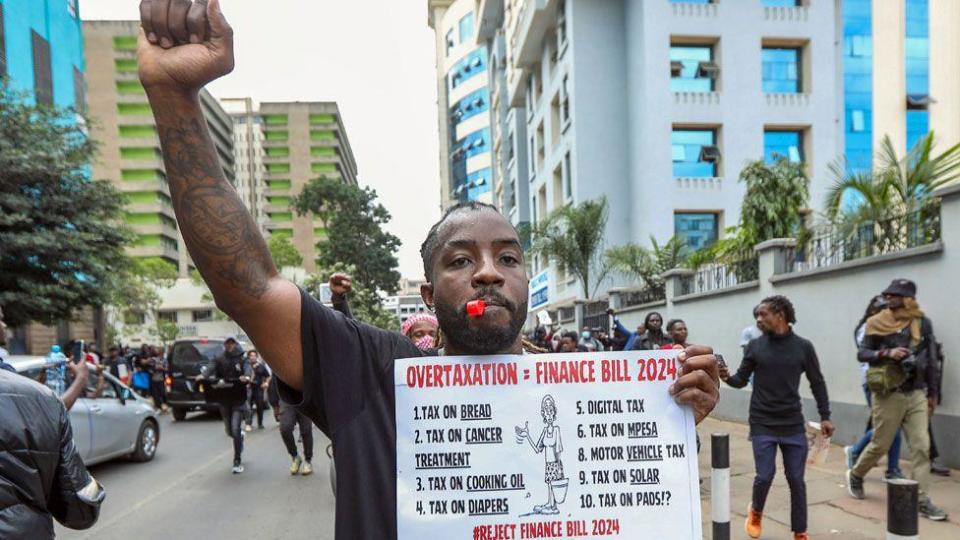

Another hashtag used by activists is “#unfollowRuto”, encouraging people to stop following the president on X, in an attempt to pressure him into withdrawing the project.
They have vowed to continue protests in Nairobi and other cities until the bill is completely abandoned.
A few days ago, presidential advisor David Ndii rudely dismissed online efforts that began on TikTok about two weeks ago, but after Tuesday’s show of force he recognized his achievement.
After the bill was published, TikTokers began making explainer videos that were widely shared on other platforms like WhatsApp, Facebook, Instagram and X – which would trend for days, helped by boosts from Kenyan influencers.
One tactic that has forced MPs to take notice is the list of their phone numbers that was shared on social media with the message “SMS your MP”.
Rep. Stephen Mule told local media that his phone was spammed with more than 30,000 messages from young Kenyans asking him to reject the bill. Other lawmakers also complained that their phones were virtually unusable due to the number of text messages they were receiving.
Local media also picked up on the online conversations, amplifying voices of protest and questions about the cost of living.
Some urged veteran opposition leader Raila Odinga to who has been the face of anti-government protests for yearsto stay away from Tuesday’s march.
He obeyed, posting on social media: “Today I am a very proud father! Congratulations to all those who courageously defended their rights!”
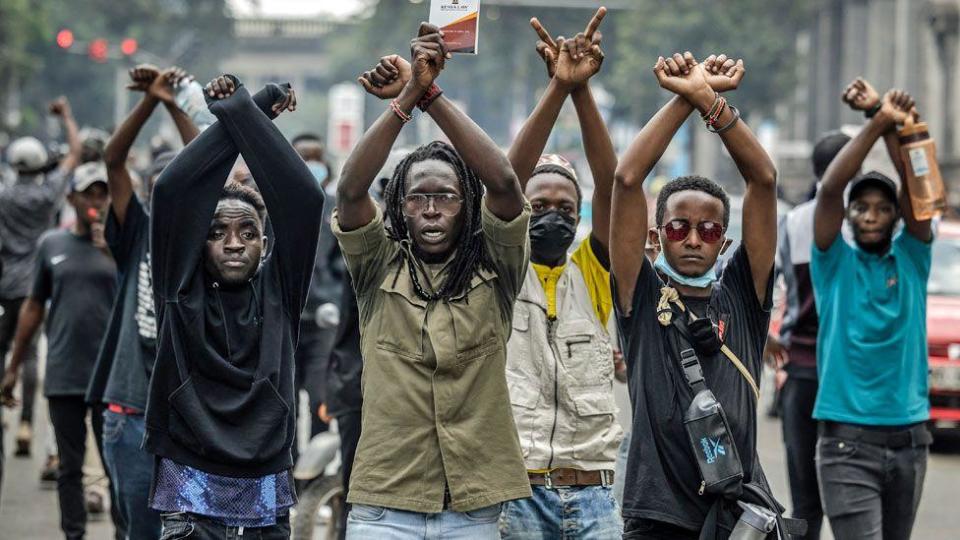

Mutuma Mathiu, a veteran journalist, said Tuesday’s events changed the dynamics of Kenyan politics: “The politics of protest has found a new fulcrum and a new and different generation of Kenyans has found its voice quite loud.”
Popular political commentator Pauline Njoroge awake: “Not only are they brave, they are also very nice and well spoken. Today’s youth-led protest was the most peaceful, but very successful.”
Professor Kivutha Kibwana, a legal scholar and former county governor, called for dialogue in your post on X: “The most dangerous thing a government can do is declare war on its youth.”
Dr. Willy Mutunga, former Chief Justice of the Supreme Court, said young people across the world have a common enemy in “their respective ruling classes, Notice: “Revolt is on the horizon.”
The government has long worried that social media could be used to promote discord and has pushed for stricter oversight by regulators.
The online collective known as Kenyans on X (KOX) is known for reporting issues and Kenya is among the countries with the highest TikTok usage rate worldwide.
In March, the interior minister threatened to restrict the use of TikTok, which he accused of spreading malicious content.
But the protesters do not intend to be intimidated.
“We are not afraid, we are not moved and this is just the beginning of the revolution. We are coming, there are many of us and in good numbers,” said Ms. Indimuli on the sidelines of Tuesday’s rally.
More BBC Kenya stories:


Go to BBCAfrica.com for more news from the African continent.
Follow us on Twitter @BBCAfricaon Facebook at BBC Africa or on Instagram at bbcafrica
































